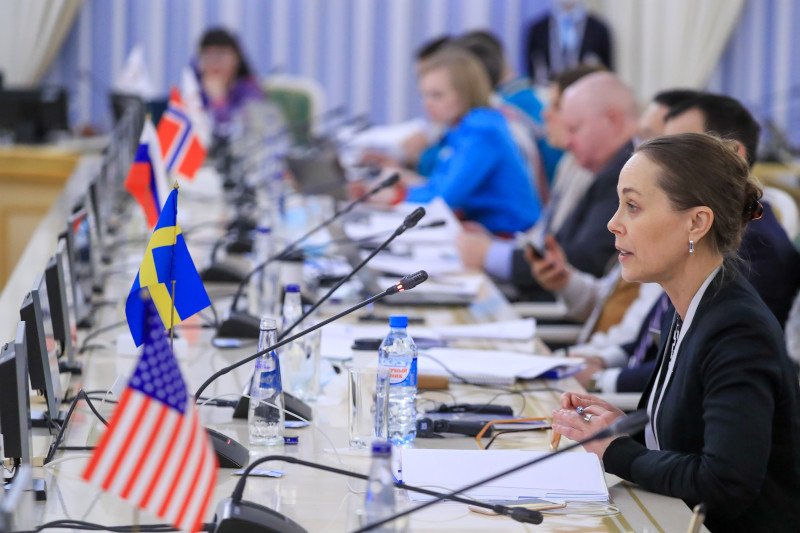Salekhard, 2 December 2021. The first Senior Arctic Officials’ (SAO) plenary meeting during the Russian Chairmanship has just concluded in Salekhard and on screens across Arctic States and Observer countries.
The Russian Federation hosted around 180 registered delegates from the eight Arctic States and six Indigenous Permanent Participant organizations, as well as the Arctic Council’s six Working Groups and over thirty Observers in a hybrid meeting format.
The meeting gave Arctic Council delegates the opportunity to discuss and advance on topics common to both the Chairmanship program of the Russian Federation and the Arctic Council’s 10-year Strategic Plan. Topics included Indigenous and regional cooperation; a review of ongoing Arctic Council projects, sustainable socio-economic development; and youth cooperation.
Indigenous and regional cooperation
Enhancing cooperation between Arctic regions and people, especially Indigenous Peoples, is one of the actions outlined in the Council’s Strategic Plan and a priority of the Russian Chairmanship. The Chairmanship therefore engaged delegates in a dialogue on regional and people-to-people cooperation and invited among other speakers its appointed Special Envoy for Indigenous and Regional Cooperation, Mikhail Pogodaev, to give an overview of his mandate and future work in support of the Chairmanship. Upcoming initiatives include an extended events program, as well as a series of special reports that will highlight both challenges and best practice examples from Arctic regions.
Advancing towards the goals of the Council’s Strategic Plan
A substantial part of the meeting was dedicated to the ongoing and emerging projects of the six Arctic Council Working Groups and the Expert Group on Black Carbon and Methane. They presented the progress of their project portfolios and demonstrated how they collaboratively are addressing cross-cutting issues in the Arctic, including wildfires, climate change impacts on Arctic ecosystems, and health issues affecting Indigenous Peoples and other Arctic inhabitants.
“This meeting yet again showcased that the Working Groups are the driving engine of the Council’s work. Projects working on mitigating and adapting to climate change, ensuring sustainable development economic development in the Arctic, exploring emerging threats including zoonoses, digitalizing the linguistic and cultural heritage of Indigenous Peoples, advancing Arctic Resilience towards the impacts of permafrost thaw, evaluating ship traffic in the Northern Sea Route – to just name a few – are already contributing to core actions of the Council’s Strategic Plan,” stated Ambassador Nikolay Korchunov, Chair of the Senior Arctic Officials.
Sustainable socio-economic development in the Arctic
The meeting in Salekhard also brought together representatives of the Arctic Council and the Arctic Economic Council for a special session. This was the second time delegates of both Councils met since signing a bilateral Memorandum of Understanding (MoU) and were able to discuss the key areas of cooperation outlined in the MoU, including sustainable economic development, blue economy, maritime safety, as well as education and capacity building. Delegates emphasized the need to further explore the synergies between the Councils’ respective working groups to enhance opportunities for future collaboration while respecting the rights of Indigenous Peoples.
Youth cooperation
Another important discussion item was the Council’s strong support for fostering sustainable and meaningful collaboration and engagement between youth and the Arctic Council. This commitment is reflected in the Council’s Strategic Plan and a dedicated thematic cluster on youth in the Chairmanship program of the Russian Federation. In Salekhard the discussion on youth engagement was introduced by the Chairmanship’s Youth Envoy for International Cooperation in the Arctic, Mikhail Uksusov, who spoke on youth-related issues in the Arctic and the need to further the potential of Arctic youth. In addition, Ekaterina Evay, RAIPON’s Indigenous Youth Envoy, outlined a series of youth-related Chairmanship events that will provide a platform and facilitate a shared leadership paradigm within the Arctic context.
Cultural program
The delegates were welcomed by the Governor of the Yamal-Nenets Autonomous Region, who was pleased to share an insight to the region, its people, and their ways of life and emphasized the importance to foster a dialogue between people in the Arctic.
The meeting included a cultural program that introduced participants to the traditional livelihoods and cultures of the Indigenous Peoples of the Yamal-Nenets Autonomous Region. Participants were also offered a tasting of northern food prepared by Indigenous youth living in the reindeer herding regions of the Arctic during a reception hosted by the project “EALLU: Indigenous Youth Food Knowledge and Arctic Change” led by the Association of World Reindeer Herders under the Council’s Sustainable Development Working Group.
Next meeting and upcoming events
The next Senior Arctic Officials plenary meeting will take place in Arkhangelsk in May 2022. In the meantime, the Russian Chairmanship’s extended event program will continue, including the Young Leaders of the Arctic Council Countries ICE in Salekhard 6-9 December and an Arctic Food Festival in Moscow on 10-11 December.
Following the SAO meeting on 2 December, Ambassador Korchunov will brief the press at 17:30 YEKT / GMT+5. The press conference will be livestreamed here: https://tass.ru/press/15137
Photos of the event are available on the Arctic Council’s Flickr account: https://flic.kr/s/aHsmXc9QZQ
The Russian Federation assumed the Chairmanship of the Arctic Council in May 2021 and will chair the intergovernmental forum until spring 2023. The Russian Chairmanship program outlines four priority areas for its two-year term: Arctic inhabitants and Indigenous Peoples, environmental protection and climate change, socioeconomic development, and strengthening the Arctic Council. More about the Russian Chairmanship priorities here: https://arctic-council.org/about/russian-chairmanship-2/. The operator of events under the Russian Chairmanship of the Arctic Council 2021-2023 is the Roscongress Foundation: https://roscongress.org/en/


